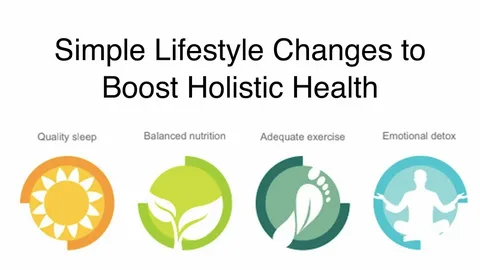Modern life can feel overwhelming, but improving your health and happiness doesn’t always require a complete life overhaul. Sometimes, it’s the smallest habits that have the biggest impact. Whether you’re feeling drained, unmotivated, or just want to improve your overall quality of life, there are practical lifestyle changes you can adopt—starting today.
In this article, we’ll walk through ten simple yet powerful lifestyle habits that support both mental clarity and physical health. Each one is easy to implement, low-cost (or free), and backed by science or real-world experience. Let’s help you feel better, inside and out.
Table of Contents
1. Prioritize Sleep Quality, Not Just Quantity
Getting 7–9 hours of sleep is important—but so is how you sleep. Deep, restorative sleep affects everything from mood to metabolism.
How to improve sleep quality:
- Avoid screens 1 hour before bed
- Keep your room cool and dark
- Stick to a consistent bedtime
- Use white noise or calming music if needed
Bonus Tip: Try magnesium-rich foods (like almonds or spinach) to help relax your nervous system before bed.
2. Start Your Day With Movement
You don’t need to hit the gym at 6 a.m. Even light activity in the morning—like stretching, yoga, or a walk—can wake up your mind and body.
Benefits of morning movement:
- Boosts mood by releasing endorphins
- Increases focus throughout the day
- Helps regulate your sleep-wake cycle
Lifestyle tip: Make it fun. Put on music or a podcast while you move to keep things enjoyable.
3. Eat Whole Foods (Most of the Time)
You don’t need a strict diet. Just focus on adding more whole foods—things that come from nature, not factories.
Easy whole food swaps:
- Replace sugary snacks with fruit or nuts
- Switch white bread for whole grain
- Cook simple meals at home instead of ordering out
Not only does this support weight and energy levels, but it can also help balance hormones and improve mental clarity.
4. Practice Digital Minimalism
We spend hours every day scrolling, clicking, and swiping. Cutting back even a little can free up time and reduce anxiety.
Try this:
- Turn off non-essential notifications
- Keep your phone out of your bedroom
- Set screen-free hours in your day
Pro Tip: Try a 24-hour “digital detox” once a month. You’ll be amazed how much clarity and free time you gain.
5. Make Time for Real Conversations
In the age of texts and DMs, meaningful conversations can feel rare. But human connection is essential to emotional wellbeing.
How to do it:
- Call a friend instead of texting
- Invite someone for coffee or a walk
- Ask open-ended questions and really listen
Even short conversations can lower stress and boost your mood.
Also read this: Cubic Zirconia Jewelry
6. Drink More Water (Seriously)
This seems basic—but dehydration is more common than you think. Many people walk around tired, sluggish, and moody because they’re not drinking enough water.
Lifestyle tip:
Carry a reusable water bottle with you and aim for at least 2–3 liters per day, depending on your climate and activity level.
Signs of dehydration:
- Dry mouth
- Headaches
- Brain fog
- Fatigue
7. Learn to Say “No” Without Guilt
Overcommitting leads to burnout. Learning to protect your time and energy is one of the most powerful lifestyle skills.
How to say no gracefully:
- “I’d love to, but I’m prioritizing rest this week.”
- “Thanks for thinking of me, but I need to pass this time.”
- “I can’t commit to that right now.”
When you protect your boundaries, you make space for the things that truly matter to you.
8. Get Outdoors Every Day
Even 10–15 minutes outside can drastically improve your mood, especially if you’re feeling stressed or stuck.
Why it works:
- Natural light boosts serotonin
- Fresh air clears your mind
- Nature helps regulate cortisol (the stress hormone)
Whether it’s a walk around the block or time in a park, fresh air is an instant mental refresh.
9. Create a “Daily Anchor” Routine
Having one small routine that you do every day can help ground your mind—even during chaotic times.
Examples:
- A 5-minute gratitude journal in the morning
- Drinking herbal tea while reading in the evening
- Listening to calming music during your commute
These rituals signal safety and stability to your brain and help reduce anxiety over time.
10. Practice Mindfulness—Your Way
You don’t need to sit cross-legged for an hour to benefit from mindfulness. Just taking a moment to pause and be present can rewire your brain for peace.
Ways to practice mindfulness:
- Focus on your breath for 60 seconds
- Eat your meals without distraction
- Observe your thoughts without judgment
Apps like Headspace or Calm offer guided sessions, but even 2 minutes of silence can reset your nervous system.
Table: Quick-Start Checklist for Daily Lifestyle Changes
| Habit | Time Needed | Mental Benefit | Physical Benefit |
|---|---|---|---|
| Morning movement | 10 mins | Improves focus & energy | Boosts circulation |
| Drink water | All-day | Reduces fatigue | Improves digestion |
| Go outside | 15 mins | Lowers stress | Increases vitamin D |
| Digital detox (daily/weekly) | Varies | Clears brain fog | Reduces eye strain |
| Mindfulness practice | 5 mins | Enhances clarity | Lowers blood pressure |
Final Thoughts
Living a healthier, more balanced life doesn’t have to mean radical changes or expensive habits. The truth is, the simplest shifts—like drinking more water, moving your body, and being more intentional with your time—can lead to profound transformations in your physical and mental wellbeing.
These lifestyle habits are not about perfection. They’re about progress. Start with one or two that resonate with you and build from there. Your mind and body will thank you.
For insightful ideas on personal growth, productivity, and lifestyle tips, explore more at IdeaFleek.


